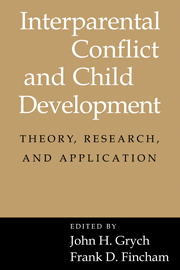Interparental Conflict and Child Adjustment: An Overview
Published online by Cambridge University Press: 01 May 2010
Summary
Researchers and clinicians have long recognized that marital and child problems tend to co-occur. Although not all would agree with Framo's assertion that “whenever you have a disturbed child you have a disturbed marriage” (Framo, 1965, p. 154), the presumption that the quality of a couple's relationship is fundamentally important for their children's development is common across a variety of theoretical perspectives (see Fincham, 1998). Empirical research supports this contention as well, showing that measures of marital dissatisfaction and discord consistently predict child adjustment problems (e.g., Buehler et al., 1997; Cummings & Davies, 1994). Marital dissatisfaction is a broad construct, however, and therefore it is critical to identify what it is about discordant marriages that may lead to child maladjustment.
In the past decade, efforts to understand the association between marital and child problems increasingly have focused on how couples express and manage conflict in their relationship. Although conflict occurs in virtually all close relationships, it tends to become more frequent and intense as marital quality erodes. Children report that observing interparental conflict is a significant stressor (Lewis, Siegal, & Lewis, 1984), and observational studies show that children typically exhibit distress when exposed to angry or aggressive interactions involving their parents (e.g., Cummings, Zahn-Waxler, & Radke- Yarrow, 1981). Moreover, interparental conflict is a better predictor of child adjustment problems than marital dissolution or global measures of marital dissatisfaction, and is related to child functioning even after controlling for overall level of marital quality (e.g., Jouriles, Murphy, & O'Leary, 1989).
- Type
- Chapter
- Information
- Interparental Conflict and Child DevelopmentTheory, Research and Applications, pp. 1 - 6Publisher: Cambridge University PressPrint publication year: 2001
- 16
- Cited by



